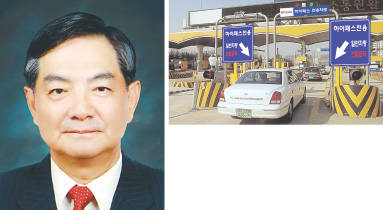KEC¡¯s Green Management Strategy
Expanding the Hi-Pass system to reduce greenhouse gas emissions

The key phrase for 2009 was ¡°green growth paradigm.¡± In the early part of the year, the Korean government finalized a draft of the Proposed Basic Act on Low-Carbon, Green Growth and in December, global leaders concurred on the need to reduce greenhouse gas emissions at the U.N. Climate Change Conference in Copenhagen. With this global background in mind, Korea Expressway Corp. (KEC) is one of a few companies who have joined the call of the times to pay heed to green growth.
KEC came up with a pack of green growth projects with the goal of spearheading a drive to ensure a ¡°green traffic culture.¡± However, people generally tend to conjure up the construction of roads and traffic snarls as environmental damage and environmental pollution. The greatest challenge in the traffic industry is how to reduce greenhouse gas emissions, since CO2 from automobiles accounts for 16.6 percent of all greenhouse gas emissions.
The specific projects KEC decided to implement include the expansion of investments in expressways, the reforestation program, dubbed ¡°LOHAS (Lifestyles Of Health And Sustainability) 1000 Project,¡± calling for transplanting 10 million trees by 2012, the installation of photovoltaic power systems and the proliferation of Hi-Pass toll charging systems.
Attracting much public attention is the promotion of the wider use of Hi-Pass toll-charging systems at a speed of 30km per hour or less in which motorists pass through toll gates without stopping to pay toll charges. The Hi-Pass system has become the subject of controversy due to pile-up traffic accidents, caused by the malfunction of the devices.
Despite the problems, expressway authorities contend that the Hi-Pass system will serve as a crucial force behind the low-carbon, green growth paradigm designed to dramatically reduce greenhouse gas emissions. The wisdom holds true.
The faster automobiles are driven, the lower their greenhouse gas emissions. On the other hand, cars stopped at toll gates to pay toll charges sit idling, serving as a major contributor of greenhouse gas emissions.
Figures released by KEC show that the use of the Hi-Pass system could reduce greenhouse gas emissions by a whopping 77,000 tons per year during the period between 2009 and 2018. It translates into savings of 108.8 billion won for 10 years. In 2009 alone, the nation¡¯s reduction of CO2 via the Hi-Pass system is estimated at approximately 24,000 tons. That proves to be true for similar systems installed in foreign countries, including Japan and Singapore.
In Japan, East Nippon Expressway Corp. said the use of an automatic toll charging system reduced greenhouse gas emissions by an annual average of 4,600 tons, an equivalent to the CO2 being inhaled by 47,000 sq. meters of forest area ¡ª the size of 73 Tokyo Dome Stadiums ¡ª during the period between 2002 and 2007.
Singapore introduced an automatic toll charging system in 1985.
The wider use of the Hi-Pass system also has the effect of creating jobs. KEC plans to install 20-odd more Hi-Pass systems by 2012, having an effect equivalent to creating an estimated 5,776 jobs by that year.
The problem is that despite their convenience, motorists are worried about the malfunctioning of Hi-Pass systems. Hi-Pass communications failure rate is estimated at 0.11 percent, a little higher than the permissible level of 0.1 percent. But KEC officials contend that many cases of malfunctioning were caused by the ill-positioning of reader devices, lack of cash deposits and improper power linkage.
The Hi-Pass system is also a suspected cause of pile-up traffic accidents, including some involving cars entering Hi-Pass lanes and others heading into other lanes. High-speed cars passing through Hi-Pass lanes are also hit by following vehicles. In an effort to prevent such accidents, KEC plans to expand Hi-Pass lanes and have Hi-Pass systems fitted with safety gates. nw
(left) Korea Expressway Corp. President Lieu Chull-ho. An increasing number of motorists use tollgate lanes for Hi-Pass charging systems, found to remarkably reduce greenhouse gas emissions.
3Fl, 292-47, Shindang 6-dong, Chung-gu, Seoul, Korea 100-456
Tel : 82-2-2235-6114 / Fax : 82-2-2235-0799